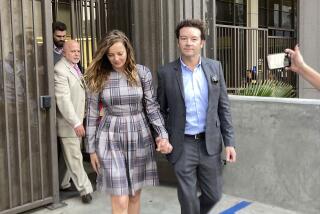Spector prosecutors will try to show a pattern
Prosecutors in the Phil Spector murder trial plan to use their first full week of testimony to try to establish that actress Lana Clarkson’s shooting death fit a pattern: Spector, when drunk, has repeatedly pulled guns on women who reject his advances.
It is the central theme of their case against the legendary music producer, who is accused of killing Clarkson, 40, in his Alhambra mansion Feb. 2, 2003.
Deputy Dist. Atty. Alan Jackson last week told the jury that four earlier incidents of gunplay followed the same script as Clarkson’s shooting -- with the exception of the final scene, when the actress was shot dead in the mouth.
Lawyers for Spector, 67, countered that the women’s stories fit a different pattern: one of bitter ex-girlfriends seeking fame or fortune at the expense of the music legend, who worked with stars such as the Beatles and Ike and Tina Turner.
Admitting testimony about prior conduct is unusual in a California trial; the law generally prohibits evidence of a defendant’s bad character.
That rule is important because “whenever anybody hears somebody did something in the past, it’s very difficult to convince them they didn’t do it again,” said Shawn Chapman Holley, a lawyer who served on O.J. Simpson’s defense team.
In the Spector case, Judge Larry Paul Fidler has allowed prosecutors to introduce the prior incidents to show a mode of operation, not as character evidence.
But judging from the courtroom appearance Friday of Dorothy Melvin, the first woman called to tell of threats by Spector, the defense could find it hard to discredit the gunplay accounts.
Melvin, a former manager for comedian Joan Rivers, remained calm and focused as she described the producer pulling a gun on her, hitting her head and ordering her to disrobe.
“She was very composed and did not try to tilt her testimony in any way,” said Jean Rosenbluth, a USC law professor following the case.
Melvin kept her cool even as defense attorney Roger Rosen questioned her about exchanging e-mails with Spector years after the 1993 incident. His apparent point: to show that the incident couldn’t have been that bad, as they remained friends.
The next prosecution witness, Stephanie Jennings, could face a tougher grilling. Jennings, who claims that Spector pulled a gun on her in 1995 when she refused to join him in his suite at the Carlyle Hotel in New York, sold a photograph of herself with Spector to the National Enquirer, said Bruce Cutler, another of Spector’s attorneys.
In his booming opening statement, Cutler made a preemptive strike on Jennings’ character. He noted that the hotel staff “thought she was a prostitute. Of course she’s not, but that’s what they thought.”
Loyola Law School professor Laurie Levenson said prosecutors probably put Melvin on first because she is among the strongest of their witnesses. A former prosecutor herself, Levenson said it is best to “package” witnesses, with the weaker ones sandwiched between two strong ones.
The challenge for the defense, Levenson said, will be to “neutralize the [women] without attacking too vigorously.” Beating up on a witness could draw the jurors’ sympathies or suggest that the testimony must be especially damaging to draw such an aggressive defense, she said.
“I don’t think the defense will get a lot of mileage out of attacking these women’s credibility,” said Rosenbluth, a former music journalist who once attended a bowling party thrown by Spector. The defense will do best, she said, by sticking to its primary theme: that forensic science shows Clarkson must have shot herself.
“They do not have to prove he didn’t put the gun in her mouth; they just have to plant a seed of doubt,” Rosenbluth said. “They can sow the seeds of reasonable doubt with the science.”
More to Read
Sign up for Essential California
The most important California stories and recommendations in your inbox every morning.
You may occasionally receive promotional content from the Los Angeles Times.










